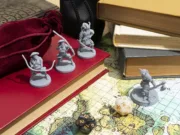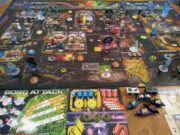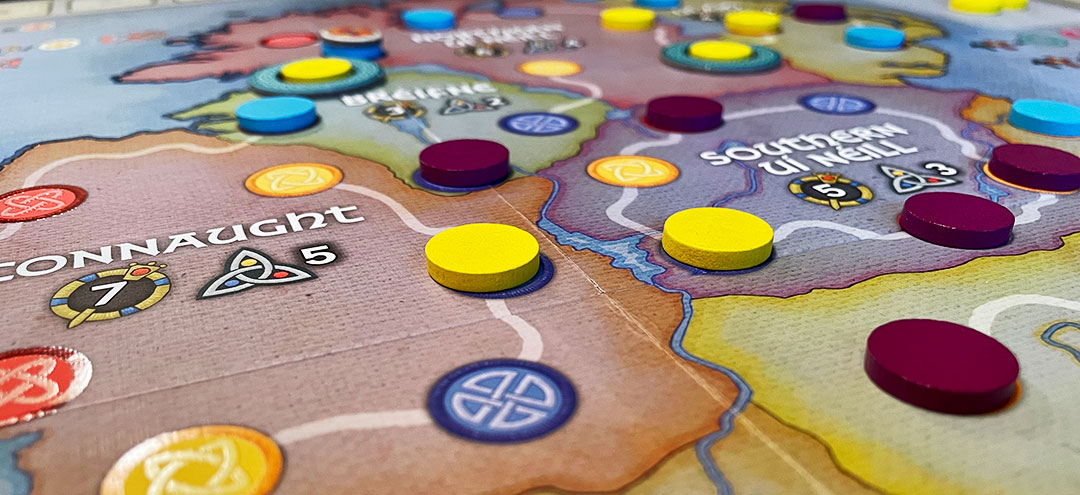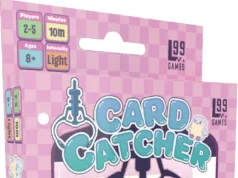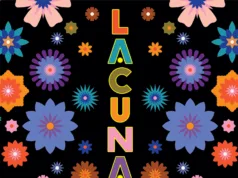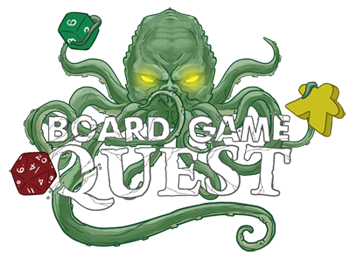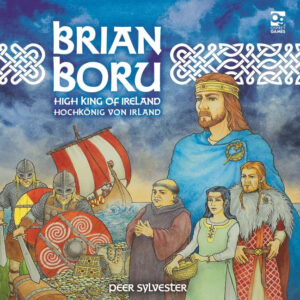 “Who?” is the obvious first question. Those willing to step into the realm of Brian Boru will learn much about the historical impact of the High King of Ireland on the first page of the rulebook. And rightfully so. Brian was quite ambitious; he had a hand in driving away invaders, dabbled in local politics, and built monasteries in the region. It sounds like he was well liked, even if he also married off various family members to forge alliances along the way.
“Who?” is the obvious first question. Those willing to step into the realm of Brian Boru will learn much about the historical impact of the High King of Ireland on the first page of the rulebook. And rightfully so. Brian was quite ambitious; he had a hand in driving away invaders, dabbled in local politics, and built monasteries in the region. It sounds like he was well liked, even if he also married off various family members to forge alliances along the way.
What a fear iontach, this Brian Boru. And what better way to be celebrated than by having your name gloriously embossed on the cover of an Osprey Games production. In a new design from Peer Sylvester, featuring art from Deirdre de Barra, three-to-five players strive to gain control of regions, repel the invading hordes, seek a hand in marriage, and get in good with the church. You know, the Brian Boru way.
Gameplay Overview:
The main board features a map of Ireland separated into eight regions. Each region’s size dictates the number of towns that must be represented to become activated for points. And you guessed it, the larger the region, the more points up for grabs. The board also features a marriage track, a battle and church area, as well as eight claim tokens associated with the different regions. At the outset, a starting town is placed in a unique region (no sharing) by all.
To start a round, a marriage card is revealed from a small stack of cards that acts as the round tracker. The final marriage card is always Estrid, Princess of Denmark. These rest atop a marriage track in which players vie for position to try to win the hand of the person featured on the card. Rewards range from points to additional towns.
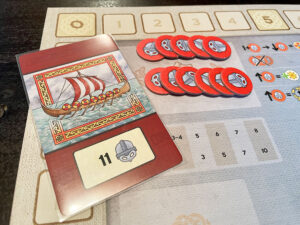
Next, a Viking card is revealed that dictates how many raider tokens are placed in the battle area. These tokens are gained through card play and benefit the player who gains the most. The nuance of this area is that if all the tokens are taken, the raiders are repelled, and no battle step is performed. Having the least tokens during the battle step causes one of your towns to be absorbed by the raiders.
With this round setup out of the way, players are dealt cards that they will draft pick and pass style. Cards feature four colors and range from number 1 to 25. Cards depict a top action activated by winning a trick, as well as two bottom actions available to choose if a trick is lost.
A trick you say? Yes, Brian Boru has a unique action system where the leading player takes the active town marker and places it on any unoccupied town space on the board they want to compete over. Towns on the board have a corresponding color and the leading player must play the matching suit. Regardless of the leading suit, other players are free to play any card from their hand, but the winner of the trick is the player who plays the highest value in the leading color.
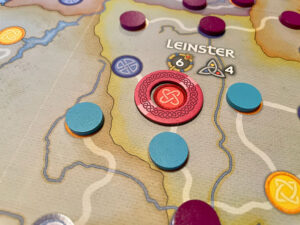
After all cards are played, actions begin with the lowest value card. Typically cards that lose activate first, while higher cards (not always the winning card) activate last. Losing players can choose one of the two bottom actions to activate, whereas the winning card must take the top action, which always grants control of the town under contention (sometimes at a cost) as well as the lead for the next trick. Thus, players can opt to play low cards or cards that don’t match the leading suit to gain powerful benefits.
Once players are left with a final card in hand, the round ends. During upkeep, the marriage, battle, church, and region sections are assessed. Highest on the marriage track gains the marriage card on display. Most raider tokens gain renown and points. Most church investment gains a monastery, which doubles a town value of the player’s choice. And finally, region markers that have met town thresholds are activated and distributed to the player with the most control.
After all rounds have ended, a final assessment of region control occurs. Points are also gained for most coins, control of the region marker, renown, and occupation based on different number of regions (a boon for those extending reach to all areas but giving up majority control). And the winner chants “Brian Boru” at the other players until they all leave the table and make their way back to the lands from which they came.
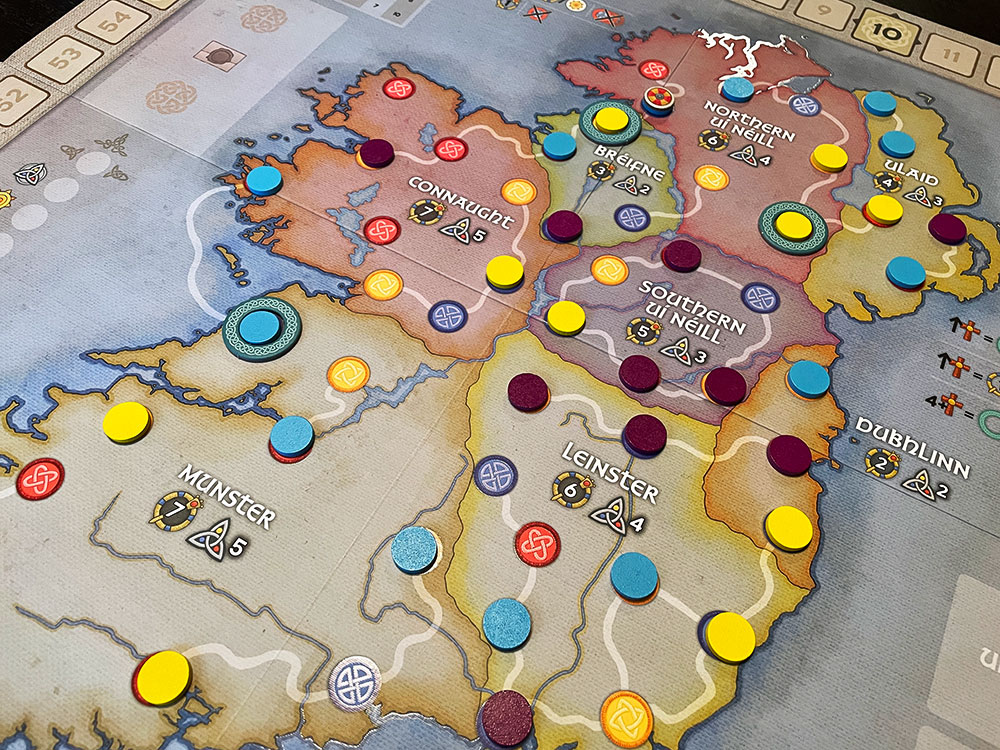
Game Experience:
It may seem like a lot, but this is a swift game that requires soft strategy as drafting decisions and card play keep players on their toes. The drafting of cards determines most of what you have access to, though everything ultimately runs through the active town marker. A blue town under contention, but you’re without high blue cards to compete? Then shift to the best rewards from the remainder of your cards to gain influence elsewhere.
Every card played in Brian Boru has meaning and it’s impossible to know who has the card that will upend your plans. Luckily, the losing rewards provide plenty of spoils, but on occasion losing out on a town in a region you’re vying to control can be very costly. The ability to shift strategy quickly based on remaining cards in hand, as well as block players from taking too much control on the board, makes each moment tense. It also makes player order incredibly important.
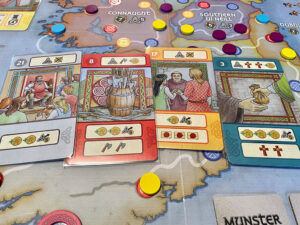
There are not many games out there that provide such boons to a losing player. But in Brian Boru, taking low cards during the draft ensures chances to win a hand in marriage, fight invaders, invest in the church, or extend a region along a connecting road. And as all areas may provide a benefit to control, having diverse options may be wise to attempt to lead as well as to curb others’ power. Winning always gives control of a town, but rarely provides other benefits, so always winning a trick isn’t the best strategy and is nigh impossible with the card draft.
The ability to gain coins becomes a valuable tool during play, as income is hard to come by and necessary to extend your reach or push further in other areas of the board. The game provides flexibility by allowing players the opportunity to pay two coins to gain an additional step when advancing on the marriage track, or taking an additional raider, or adding more investment into the church. The game’s flexibility is also present when players are unable to pay coin to pay for a newly acquired town, which will instead cost them two points. Nothing is unattainable for the right price.
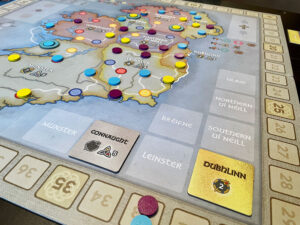
Brain Boru stays fresh at every step. I’ve seen players push for power in all areas and compete for wins. There’s perfect knowledge of which cards are available but imperfect knowledge about who holds what advantage. Wins have been hard fought and come down to the wire. The card play inspires table talk and extreme investment into everyone’s turn. We’ve even seen players spurn potential suitors due to not rewarding a town with their hand. Looking at you Brigid.
So, is there anything to dislike about Brian Boru? It’s hard to grasp anything that really stands out, though having yellow and orange player colors that are hard to distinguish from the red/yellow spaces on the board seems like the most obvious oversight. Beyond that, there are too many gold coins and not enough raider tokens. And a new player stepping into the game against hardened political veterans may struggle to keep up due to lack of card pool knowledge, though even this can be overcome after a couple of sessions.
Final Thoughts:
Say his name: Brian Boru! A new champion has arisen in the realm of trick-taking area control. There are so many fresh interlocking ideas at play that it’s hard to find many faults. From drafting to an ever-shifting region dominance, to adventures in marriage and battle and monasteries. It can feel stripped of theme when looking from afar, but once you settle into the mechanisms on display, each action feels like an engrossing step into the politics of the time. And all of it stems from the true exploits of one Brian Boru: High King of Ireland. By embracing the new and pairing it with an intriguing historical period, Peer Sylvester has created one of the best games of 2021.
Final Score: 4.5 stars – No trick, take every opportunity to seek this out. Brian Boru has found a permanent place on my shelf.
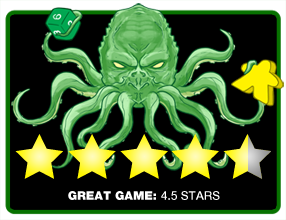 Hits:
Hits:
• Trick-taking action selection
• Tactical decision space
• Paths to victory
• Easy setup and fast gameplay
Misses:
• Needs different player colors
• New player disadvantage
• Minor component quibble




